Reissue CDs Weekly: Kraftwerk - in colour, from Autobahn to The Mix | reviews, news & interviews
Reissue CDs Weekly: Kraftwerk - in colour, from Autobahn to The Mix
Reissue CDs Weekly: Kraftwerk - in colour, from Autobahn to The Mix
When reissues are not reissues
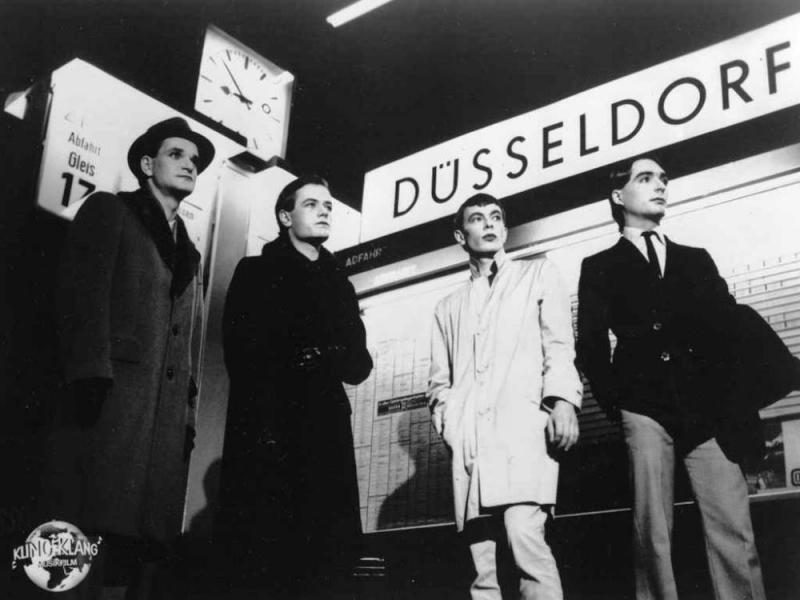
After Florian Schneider left Kraftwerk in 2008, Ralf Hütter was left in the driving seat. The pair had first been heard on record in 1970 as members of Organisation, and their first album as Kraftwerk followed later in the year.
Post-Schneider (he died in 2020), Kraftwerk’s first outputs were, in 2009, a series of 3D live performances and reissues of most of their albums. Really though, Kraftwerk just-about ceased being an in-the-moment recording entity in 1999 with the release of the “Expo 2000” single. After that, there was the conceptually familiar though recently recorded Tour de France Soundtracks album (2003) and the live album Minimum-Maximum (2005). There was also the further live set 3-D The Catalogue (2017). In the 21st century, Kraftwerk are about revisiting their past.
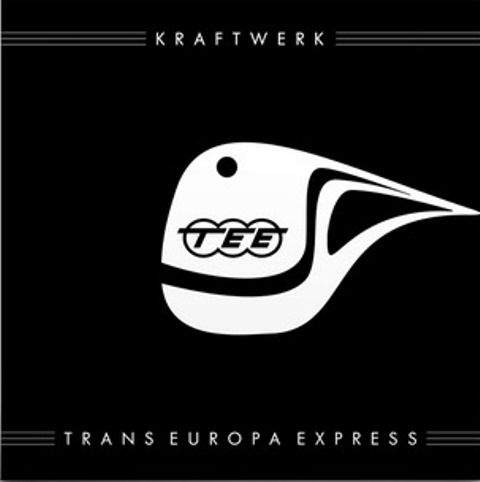 The problem with this reconfiguring, remixing and revisiting is that it overshadows what made Kraftwerk great in the first place – the extraordinary, peerless albums they made, and the concomitant ways they were marketed and packaged. These were albums created from scratch and are amongst popular music’s greatest: Autobahn (1974), Radio-Activity (1975), Trans-Europe Express (1977), The Man-Machine (1978) and Computer World (1981). (pictured right, Trans Europa Express as it is now)
The problem with this reconfiguring, remixing and revisiting is that it overshadows what made Kraftwerk great in the first place – the extraordinary, peerless albums they made, and the concomitant ways they were marketed and packaged. These were albums created from scratch and are amongst popular music’s greatest: Autobahn (1974), Radio-Activity (1975), Trans-Europe Express (1977), The Man-Machine (1978) and Computer World (1981). (pictured right, Trans Europa Express as it is now)
Stepping into the recent-ish miasma of modification is a set of new vinyl releases: Autobahn, Radio-Activity, Trans-Europe Express, The Man-Machine, Computer World, Techno Pop (originally released as Electric Café), The Mix and Tour de France (originally released as Tour de France Soundtracks). The first six are from the years they were making new records as such, rather than amending, re-rendering or springing-off from what had already been out.
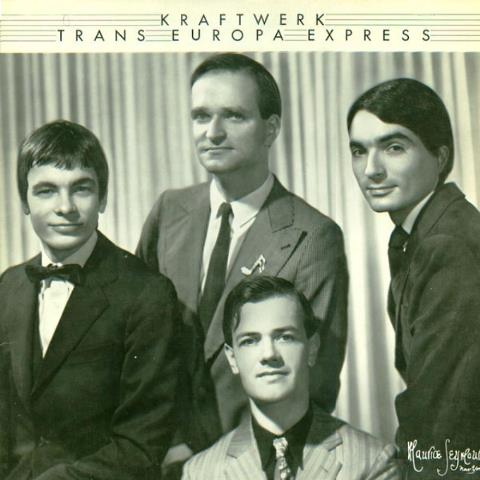 Four German counterparts are also issued: Radio-Activität, Trans Europa Express, Die Mensch-Maschine and Computerwelt. Radio-Activität and Radio-Activity were the same album, but had different sleeves in different markets. The other three feature German-language vocals. (pictured left, Trans Europa Express as it was in 1977)
Four German counterparts are also issued: Radio-Activität, Trans Europa Express, Die Mensch-Maschine and Computerwelt. Radio-Activität and Radio-Activity were the same album, but had different sleeves in different markets. The other three feature German-language vocals. (pictured left, Trans Europa Express as it was in 1977)
These differ from the 2009 reissues as they are now on coloured vinyl. The first pressing of Die Mensch-Maschine in 1978 was on red vinyl but otherwise this is a fresh twist. There’s a blue Autobahn, a yellow Radio-Activity/Radio-Activität, a clear Trans-Europe Express/Trans Europa Express, a red The Man-Machine/Die Mensch-Maschine, a neon yellow Computer World/Computerwelt (like 1978’s luminous “Neon Lights” single), a clear Techno Pop, white for the double set The Mix and discs in blue and red for the double set Tour de France. The inserts and inner bags are as per the 2009 packages.
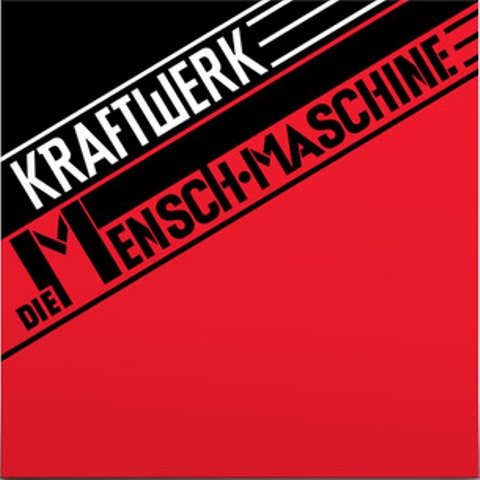 Also like the 2009 reissues, the sleeves are not those which were in the shops when the albums were first released. Computer World and Tour de France are close to the originals, but the others have front covers which first appeared in 2009. Taken along with the title change from Electric Café to the originally unused title Techno Pop and the minor elision from Tour de France Soundtracks to Tour de France, it’s impossible not to wonder why the original things are unsuitable for today’s world. (pictured right, Die Mensch-Maschine as it is now)
Also like the 2009 reissues, the sleeves are not those which were in the shops when the albums were first released. Computer World and Tour de France are close to the originals, but the others have front covers which first appeared in 2009. Taken along with the title change from Electric Café to the originally unused title Techno Pop and the minor elision from Tour de France Soundtracks to Tour de France, it’s impossible not to wonder why the original things are unsuitable for today’s world. (pictured right, Die Mensch-Maschine as it is now)
Only Ralf Hütter has the answer. The promotional material refers to “the stunning cover artworks and visuals conceptualised, created and produced over five decades by Ralf Hütter.” While there were originally cases of different sleeves in Germany and the UK at the time of release – Autobahn, for example – that was then: a contemporaneous rather than subsequent decision. It feels a shame that these fundamental aspects of Kraftwerk’s history and identity are altered after the fact. Make no mistake, these are lovely packages. But they are not reissues. They are reconfigurations.
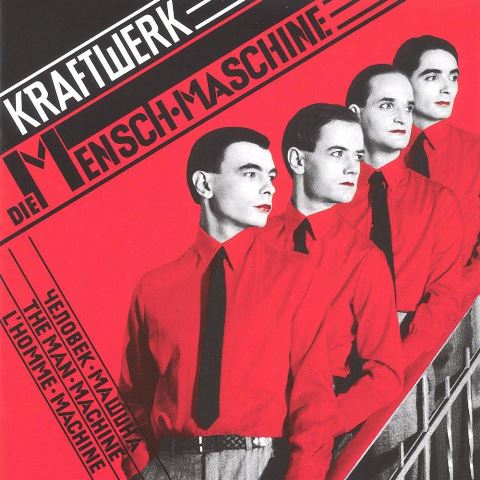 Yet it must be made clear that they sound amazing. The new Radio-Activität, Trans Europa Express, Die Mensch-Maschine, Computerwelt, Techno Pop and The Mix were supplied for review. The digital masters used are those created for the 2009 releases. A very hard listen to the new Radio-Activität and Trans Europa Express and comparisons with original German pressings of both reveals that no remixing has taken place. (pictured left, Die Mensch-Maschine as it was in 1978)
Yet it must be made clear that they sound amazing. The new Radio-Activität, Trans Europa Express, Die Mensch-Maschine, Computerwelt, Techno Pop and The Mix were supplied for review. The digital masters used are those created for the 2009 releases. A very hard listen to the new Radio-Activität and Trans Europa Express and comparisons with original German pressings of both reveals that no remixing has taken place. (pictured left, Die Mensch-Maschine as it was in 1978)
The sound has a wider dynamic range than the original albums, with the louds louder and the quiets quieter: what would be expected from a CD. However, unlike many CD reissues the warmth inherent in the original recordings has been retained. Radio-Activität is as it was, but with that added punchiness. On Trans Europa Express, the latter aspect amplifies a hardness to the rhythms. As Electric Café, Techno Pop was Kraftwerk’s first digital recording and had a flintiness difficult on the ears at the time. Though still apparent, it’s become a less grating experience over the years. The Mix, a confabulation which could not have been created in a pre-digital world, is very hard-hitting.
It’s hard to figure out who these new coloured-vinyl packages are aimed at. The single albums sell for around £22 and the doubles for about £28. Most interested fans will already the albums in some form. Who will want to fork out again? As fetching as these iterations are, they represent a history which has been rewritten. More noteworthy would be proper reissues rather than bootlegs of the first three Kraftwerk albums, all of which remain out of catalogue.
- Next week: Showdown – soul legend Kenny Carter's unreleased 1966 album
- More reissue reviews on theartsdesk
- Kieron Tyler’s website
Buy
Explore topics
Share this article
The future of Arts Journalism
You can stop theartsdesk.com closing!
We urgently need financing to survive. Our fundraising drive has thus far raised £49,000 but we need to reach £100,000 or we will be forced to close. Please contribute here: https://gofund.me/c3f6033d
And if you can forward this information to anyone who might assist, we’d be grateful.

Subscribe to theartsdesk.com
Thank you for continuing to read our work on theartsdesk.com. For unlimited access to every article in its entirety, including our archive of more than 15,000 pieces, we're asking for £5 per month or £40 per year. We feel it's a very good deal, and hope you do too.
To take a subscription now simply click here.
And if you're looking for that extra gift for a friend or family member, why not treat them to a theartsdesk.com gift subscription?
more New music
 Album: Reneé Rapp - Bite Me
Second album from a rising US star is a feast of varied, fruity, forthright pop
Album: Reneé Rapp - Bite Me
Second album from a rising US star is a feast of varied, fruity, forthright pop
 Album: Cian Ducrot - Little Dreaming
Second album for the Irish singer aims for mega mainstream, ends up confused
Album: Cian Ducrot - Little Dreaming
Second album for the Irish singer aims for mega mainstream, ends up confused
 Album: Bonniesongs - Strangest Feeling
Intriguing blend of the abstract, folkiness, grunge and shoegazing from Sydney
Album: Bonniesongs - Strangest Feeling
Intriguing blend of the abstract, folkiness, grunge and shoegazing from Sydney
 Album: Debby Friday - The Starrr of the Queen of Life
Second from Canadian electronic artist and singer offers likeable, varied EDM
Album: Debby Friday - The Starrr of the Queen of Life
Second from Canadian electronic artist and singer offers likeable, varied EDM
 Music Reissues Weekly: The Pale Fountains - The Complete Virgin Years
Liverpool-born, auteur-driven Eighties pop which still sounds fresh
Music Reissues Weekly: The Pale Fountains - The Complete Virgin Years
Liverpool-born, auteur-driven Eighties pop which still sounds fresh
 Album: Indigo de Souza - Precipice
US singer's fourth ups the pop ante but doesn't sacrifice lyrical substance
Album: Indigo de Souza - Precipice
US singer's fourth ups the pop ante but doesn't sacrifice lyrical substance
 Album: Mádé Kuti - Chapter 1: Where Does Happiness Come From?
Lively new album from the third generation of Nigeria's first musical family
Album: Mádé Kuti - Chapter 1: Where Does Happiness Come From?
Lively new album from the third generation of Nigeria's first musical family
 The Human League/Marc Almond/Toyah, Brighton Beach review - affable 1980s-themed seaside package
Retro pop extravaganza bolstered by a (mostly) balmy evening
The Human League/Marc Almond/Toyah, Brighton Beach review - affable 1980s-themed seaside package
Retro pop extravaganza bolstered by a (mostly) balmy evening
 Album: Alice Cooper - The Revenge of Alice Cooper
The original Alice Cooper band are back to fly the flag for all the weirdos
Album: Alice Cooper - The Revenge of Alice Cooper
The original Alice Cooper band are back to fly the flag for all the weirdos
 Album: Paul Weller - Find El Dorado
Inspiring curation of some pretty great covers, and hints of majesty
Album: Paul Weller - Find El Dorado
Inspiring curation of some pretty great covers, and hints of majesty
 Album: Spafford Campbell - Tomorrow Held
The young duo extend folk’s boundaries into an expansive contemporary chamber music
Album: Spafford Campbell - Tomorrow Held
The young duo extend folk’s boundaries into an expansive contemporary chamber music
 Music Reissues Weekly: Mike Taylor - Pendulum, Trio
The return of two idiosyncratic, uncompromising Sixties British jazz rarities
Music Reissues Weekly: Mike Taylor - Pendulum, Trio
The return of two idiosyncratic, uncompromising Sixties British jazz rarities

Add comment